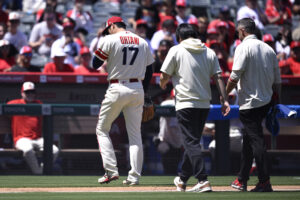Rangers right-hander Nathan Eovaldi, who has been on the injured list for over a month thanks to a forearm strain, has recently been expected to rejoin the Texas rotation during their upcoming series against the Mets, which begins tomorrow. As noted by Evan Grant of the Dallas Morning News, however, that won’t come to fruition after Eovaldi felt some discomfort in his side during a bullpen session on Thursday. The new plan is for Eovaldi to partake in another bullpen session on Tuesday before the club determines whether he’ll need a rehab assignment or can directly return to the club’s pitching staff.
Eovaldi’s continued absence is a serious blow to the Rangers, as the right-hander has posted a phenomenal 2.69 ERA and 3.23 FIP in 123 2/3 innings of work this season. By measure of ERA+, he’s been 61% better than league average when on the field this season. That sort of production is difficult to replace, and while deadline acquisitions Max Scherzer and Jordan Montgomery have done an admirable job with a combined 2.22 ERA across nine starts since joining the organization, the club has nonetheless posted a record of just 17-17 since Eovaldi went on the shelf, a mediocre performance that’s allowed the surging Mariners to catch them in the standings.
More from around MLB’s West divisions…
- While plenty of suitors for superstar Shohei Ohtani may have a renewed sense of caution regarding his impending free agency after it was announced that the two-way phenom is dealing with a UCL tear that will prevent him from taking the mound again this season, John Shea of the San Francisco Chronicle suggests that the Giants are not among those teams and will still aggressively pursue Ohtani. Shea asserts that the Giants have the financial muscle required to get a deal done, referencing big-money offers to Aaron Judge and Carlos Correa last offseason that ultimately didn’t reach the finish line, while also suggesting the the club’s tendency to be cautious regarding pitcher healthy could be attractive for Ohtani as he looks to work his way back onto the major league mound.
- Angels right-hander Chase Silseth exited last night’s game against the Mets following a scary moment where he was struck in the head by an errant throw from teammate Trey Cabbage. After initially falling to the ground after being struck, Silseth was helped off the field by team trainers. Fortunately, the worst appears to have been avoided, as ESPN notes that manager Phil Nevin told reporters that he “think(s) we avoided something serious, but with head injuries you always want to be cautious.” Silseth owns a 4.10 ERA (111 ERA+) in 48 1/3 innings of work while swinging between the rotation and bullpen for the Angels this season.
